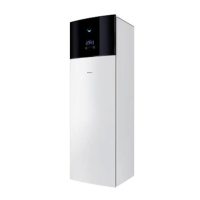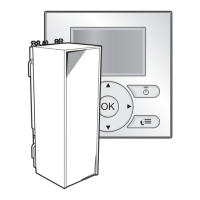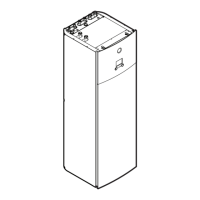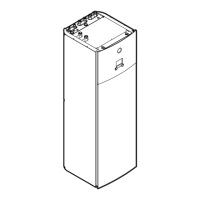Do you have a question about the Daikin EHVH04S18DA6V and is the answer not in the manual?
Requirements for selecting a suitable and safe installation location for the unit.
Guidelines and precautions related to handling and charging refrigerant in the system.
Detailed safety precautions and guidelines for electrical wiring and connections.
Procedures for unpacking, handling, and removing accessories for the outdoor unit.
Procedures for unpacking, handling, and removing accessories for the indoor unit.
Guidelines for configuring the system for space heating and cooling based on room requirements.
Configuration for single-room heating/cooling using wired or wireless thermostats and heat pump convectors.
Configuration for systems serving multiple rooms with a single leaving water temperature zone.
Guidance for systems with two leaving water temperature zones, including mixing valve requirements.
Guidelines for setting up the domestic hot water tank, including volume selection and temperature settings.
How to read and configure energy data, including produced heat and consumed energy.
How to limit the total system power consumption by setting limitation levels.
Instructions for connecting and configuring external sensors for indoor or outdoor ambient temperature measurement.
Guidance on choosing a suitable installation location and avoiding hazardous environments.
Specific spacing guidelines and requirements for installing the outdoor unit.
Requirements for the indoor unit installation site, including ambient temperatures and dimensions.
Specifies requirements for piping material, diameter, temper grade, and thickness.
General information and safety precautions related to preparing electrical wiring.
How to connect the system to preferential kWh rate power supply systems.
Guidance on creating a secure and level installation structure for the outdoor unit.
Step-by-step instructions for positioning and fixing the outdoor unit onto its installed structure.
How to ensure proper drainage of condensation water to prevent ice accumulation.
Step-by-step instructions for placing and leveling the indoor unit on the floor.
Crucial safety precautions and warnings regarding refrigerant piping connections.
Best practices and guidelines for connecting refrigerant piping, including tightening torque.
Detailed instructions on correctly flaring pipe ends to prevent refrigerant leaks.
How to correctly use stop valves and service ports, including precautions against excessive force.
Instructions for connecting the liquid and gas refrigerant pipes to the outdoor unit's stop valves.
Instructions for connecting the refrigerant pipes to the indoor unit's connections.
Important precautions for leak testing and vacuum drying, including using proper equipment.
Step-by-step procedure for detecting refrigerant leaks using a bubble test solution.
Detailed procedure for performing vacuum drying to remove moisture and air from the system.
Crucial safety precautions and warnings regarding refrigerant charging.
Step-by-step instructions for charging additional refrigerant into the system.
Important safety precautions and warnings related to connecting water piping.
Instructions for connecting space heating/cooling and domestic hot water pipes to the indoor unit.
Instructions for connecting the drain hose from the unit to an appropriate drain.
Critical safety precautions and warnings for connecting electrical wiring, especially regarding electrocution.
Best practices for installing wires, including terminal types and tightening torques.
Step-by-step instructions for connecting electrical wiring to the outdoor unit's switch box.
Instructions for routing and connecting electrical wiring to the indoor unit.
How to connect the main power supply to the indoor unit for both normal and preferential kWh rates.
Instructions for connecting the backup heater power supply, including capacity and wiring diagrams.
Configuration for the main heating/cooling zone, including emitter type, setpoint, and modulation.
Configuration for an additional heating/cooling zone, including emitter type, setpoint, and WD curves.
Settings for domestic hot water tank operation, including powerful operation, setpoints, and heat-up modes.
Critical safety precautions and warnings to follow before and during commissioning.
Safety precautions to follow before performing any maintenance or service work.
Essential safety precautions to follow before and during troubleshooting.
Guides users on how to diagnose and fix problems based on observed symptoms.
How to access detailed error descriptions and help text for malfunctions on the user interface.
A comprehensive list of error codes for both outdoor and indoor units with their descriptions.
Wiring diagram for the outdoor unit, including connection diagrams, notes, and legends.
Wiring diagram for the indoor unit, detailing connections for power, options, and sensors.












